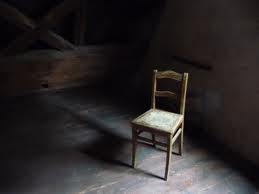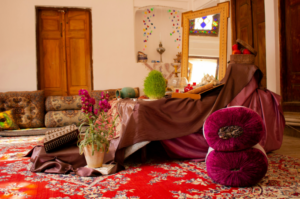Esosa stands in front of the door she has randomly picked, waiting for something to happen. The hallway is dark. There is no sound. All the doors are closed. But she can sense longing. The rooms are dreaming. They all want to become houses. But right now they are just silly little rooms, chained together with nothing but concrete walls.
Face-me-I-face-you. That’s what people around here call these architectures of despair. Five or more pairs of rooms facing each other, mute, motionless, and twin-like. Face-me-I-face-you, as if the rooms had faces. As if they could speak. On the contrary, each room is a room of hunger, hunger for space and a chance to live beyond the time of accumulated lives. The lives it bears, the bodies it carries are so many, and time finding no way to flow, has stopped. And the odor of things that leave but never go away and the dismemberment of a room into spaces one ought otherwise to find in a house is sad and monstrous. How, Esosa thinks to herself, can you eat, sleep, study, fuck and pray in the same 20 by 16 feet? And to think that whole families live here in this one room that pretends to play house. Just then, she remembers that her brother died in this room.
She doesn’t know why she’s here after 12 years. She, her parents, and the dead body picked up and left. Just like that. And she’s never been back, not even to this city that is itself dying. Benin City, still living the afterlife of an ancient glory. When she rode through the bloody redness of the dirt roads, she could not help thinking that the city was dying a second death. Dying even in its afterlife.
When the door opens, the face that peeks through is comforting. There is something premature about the dullness of her eyes. Age, it seems, came much too early, 20 years early perhaps. She has no reason to be welcoming. But she is, and abundantly so. As if she has been waiting for Esosa all this while, waiting for Esosa to give an account of the piece of herself that was left behind when she lived there.
“Did you say you once lived here, the woman asks. There is so much more to this question. Esosa knows that but she does not answer because the muffled sound of boiling water interrupts. The woman gets up to make some tea.
There are no lines of demarcation. You just know where in the little room is where. The kitchen area is a kerosene stove and a clutter of utensils. A prisoner’s bed, a pair of old-fashioned tin boxes overflowing with clothing, a stool, a large fragment of a mirror, in front of the mirror a red lipstick with its cap open, a dirty bottle of cheap perfume, a tin of Saturday Night. There you have the bedroom. A couch, a stool, and a parch of linoleum mark off the living room. Above the door, leaning on its head is a bible and a cross. But there is something holding together these scraps of rooms withing the room. When she figures it out, Esosa smiles. A row of calendars neatly hung up to form a line circles all four walls. One calendar for every year since 1983.
The woman places a tray on the stool. Holding an enamel bowl with two hands, she pours herself and Esosa tea in plastic cups. The tea is weak, nearly milkless and much too sweet.
Not knowing what else to say, Esosa turns her attention to the soapy aftertaste of the tea. She does not know whether she should answer the woman’s last question. More so the real question behind the woman’s question is this: “why are you here? You. A stranger. Pleasantly interrupting what would have been just another rainy afternoon?” If the woman had put the question that way, maybe she might have told her that she is here because she is working on some kind of geography of the self, the kind that isolates the natural elements that make up one’s life. She is returning to those places she once lived in, measuring distances and penciling in boundaries to know just how far she had come in life. She hoped that by the time she’s done, her life would have become a map-maker’s dream. But for the time being, it’s just her and this woman blowing on her tea as if that would make it any cooler and looking at the window as though wishing it were open. It was as if she had been waiting for Esosa, as if she herself has long been in need of the fellowship that existed only among fellow wanderers.










Joe Aito December 04, 2016 10:57
This is really lovely.